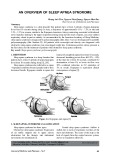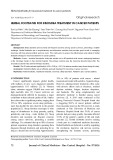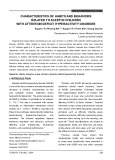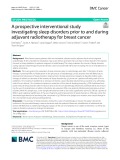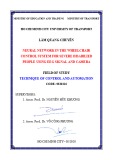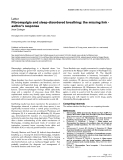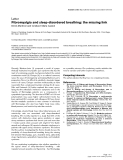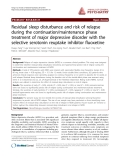
Sleep disorders
-
Sleep apnea syndrome is a sleep disorder that patients have at least 5 periods of apnea-hypopnea for at least 10 seconds during sleep. In Asia, a frequency of approximately 4.1% - 7.5% in men and 2.1% - 3.2% in women, similar to the European-American. Airway narrowing associated with reduced nerve impulses leading to the upper respiratory during sleep and the onset of apnea, can cause sudden respiratory closed in part or entirely.
 7p
7p  vifaye
vifaye
 20-09-2024
20-09-2024
 2
2
 1
1
 Download
Download
-
Sleep disorders and insomnia are frequent concerns among cancer survivors, presenting a notable challenge. Herbal footbaths are a complementary and alternative medicine that provides good results in managing insomnia, with few adverse effects and low costs. This study aims to assess the effectiveness and safety of herbal footbaths therapy for insomnia treatment in cancer patients.
 6p
6p  vinatisu
vinatisu
 29-08-2024
29-08-2024
 4
4
 1
1
 Download
Download
-
Inappropriate sleep habits and behaviors are very common in children with attention deficit hyperactivity disorder (ADHD), often related to sleep disorders. A cross-sectional descriptive study was conducted on 277 children aged 6 to 12 years old, at the Vietnam National Children's Hospital from October 2022 to September 2023; we analyze the characteristics of inappropriate sleep-related habits and behaviors in those children who were diagnosed with ADHD.
 8p
8p  vinatisu
vinatisu
 23-08-2024
23-08-2024
 2
2
 1
1
 Download
Download
-
Most breast cancer patients with non-metastatic disease receive adjuvant local or loco-regional radiotherapy. To be scheduled for irradiation may cause distress and fears that can lead to sleep disorders. Few reports focused on sleep problems in patients assigned to radiotherapy.
 6p
6p  vielonmusk
vielonmusk
 21-01-2022
21-01-2022
 19
19
 0
0
 Download
Download
-
The research works were published at international paper mainly focused on diagnosing epilepsy sleep disorders, coma and brain death, stress, depresssion pathological… in automation field as spelling, eye blink, head movement, mental arithmetic… this were performed by offline, no mainly focus on resolving in realtime and in control automation field.
 33p
33p  gaocaolon6
gaocaolon6
 30-07-2020
30-07-2020
 44
44
 3
3
 Download
Download
-
Behavioral arousal requires integration of multiple neurotransmitter and neuromodulatory systems. Identifying these systems is the key to not only a better understanding of the neurobiology of sleep⁄wakefulness but may also lead to the discovery of potential therapeutic targets for various sleep disorders.
 5p
5p  dell39
dell39
 27-03-2013
27-03-2013
 35
35
 4
4
 Download
Download
-
Tuyển tập các báo cáo nghiên cứu về y học được đăng trên tạp chí y học General Psychiatry cung cấp cho các bạn kiến thức về ngành y đề tài: Fibromyalgia and sleep-disordered breathing: the missing link author’s response...
 1p
1p  thulanh14
thulanh14
 17-10-2011
17-10-2011
 52
52
 6
6
 Download
Download
-
Tuyển tập các báo cáo nghiên cứu về y học được đăng trên tạp chí y học General Psychiatry cung cấp cho các bạn kiến thức về ngành y đề tài: Fibromyalgia and sleep-disordered breathing: the missing link...
 1p
1p  thulanh14
thulanh14
 17-10-2011
17-10-2011
 30
30
 3
3
 Download
Download
-
Tuyển tập các báo cáo nghiên cứu về y học được đăng trên tạp chí y học General Psychiatry cung cấp cho các bạn kiến thức về ngành y đề tài: Residual sleep disturbance and risk of relapse during the continuation/maintenance phase treatment of major depressive disorder with the selective serotonin reuptake inhibitor fluoxetine...
 5p
5p  thulanh11
thulanh11
 10-10-2011
10-10-2011
 55
55
 4
4
 Download
Download
-
Drugs that act upon the central nervous system (CNS) influence the lives of everyone, every day. These agents are invaluable therapeutically because they can produce specific physiological and psychological effects. Without general anesthetics, modern surgery would be impossible. Drugs that affect the CNS can selectively relieve pain, reduce fever, suppress disordered movement, induce sleep or arousal, reduce the desire to eat, or allay the tendency to vomit. Selectively acting drugs can be used to treat anxiety, mania, depression, or schizophrenia and do so without altering consciousness....
 389p
389p  vanass
vanass
 01-04-2011
01-04-2011
 106
106
 10
10
 Download
Download
-
Medical Implications of Circadian Rhythmicity Prominent circadian variations have been reported in the incidence of acute myocardial infarction, sudden cardiac death, and stroke, the leading causes of death in the United States. Platelet aggregability is increased after arising in the early morning hours, coincident with the peak incidence of these cardiovascular events. A better understanding of the possible role of circadian rhythmicity in the acute destabilization of a chronic condition such as atherosclerotic disease could improve the understanding of the pathophysiology.
 8p
8p  ongxaemnumber1
ongxaemnumber1
 29-11-2010
29-11-2010
 73
73
 4
4
 Download
Download
-
Shift-Work Disorder: Treatment Caffeine is frequently used to promote wakefulness. However, it cannot forestall sleep indefinitely, and it does not shield users from sleep-related performance lapses. Postural changes, exercise, and strategic placement of nap opportunities can sometimes temporarily reduce the risk of fatigue-related performance lapses. Properly timed exposure to bright light can facilitate rapid adaptation to night-shift work. While many techniques (e.g.
 5p
5p  ongxaemnumber1
ongxaemnumber1
 29-11-2010
29-11-2010
 64
64
 4
4
 Download
Download
-
Circadian Rhythm Sleep Disorders A subset of patients presenting with either insomnia or hypersomnia may have a disorder of sleep timing rather than sleep generation. Disorders of sleep timing can be either organic (i.e., due to an intrinsic defect in the circadian pacemaker or its input from entraining stimuli) or environmental (i.e., due to a disruption of exposure to entraining stimuli from the environment). Regardless of etiology, the symptoms reflect the influence of the underlying circadian pacemaker on sleep-wake function.
 5p
5p  ongxaemnumber1
ongxaemnumber1
 29-11-2010
29-11-2010
 54
54
 4
4
 Download
Download
-
Source: Modified from TA Roth, L Merlotti in SA Burton et al (eds), Narcolepsy 3rd International Symposium: Selected Symposium Proceedings, Chicago, Matrix Communications, 1989. Narcolepsy affects about 1 in 4000 people in the United States and appears to have a genetic basis.
 4p
4p  ongxaemnumber1
ongxaemnumber1
 29-11-2010
29-11-2010
 63
63
 4
4
 Download
Download
-
Parasomnias The term parasomnia refers to abnormal behaviors or experiences that arise from or occur during sleep. A continuum of parasomnias arise from NREM sleep, from brief confusional arousals to sleepwalking and night terrors. The presenting complaint is usually related to the behavior itself, but the parasomnias can disturb sleep continuity or lead to mild impairments in daytime alertness. Two main parasomnias occur in REM sleep: REM sleep behavior disorder (RBD), which will be described below, and nightmare disorder.
 5p
5p  ongxaemnumber1
ongxaemnumber1
 29-11-2010
29-11-2010
 99
99
 4
4
 Download
Download
-
Specific questioning about the occurrence of sleep episodes during normal waking hours, both intentional and unintentional, is necessary to determine the extent of the adverse effects of sleepiness on a patient's daytime function. Specific areas to be addressed include the occurrence of inadvertent sleep episodes while driving or in other safety-related settings, sleepiness while at work or school (and the relationship of sleepiness to work and school performance), and the effect of sleepiness on social and family life.
 5p
5p  ongxaemnumber1
ongxaemnumber1
 29-11-2010
29-11-2010
 68
68
 4
4
 Download
Download
-
Restless Legs Syndrome (RLS) Patients with this sensory-motor disorder report an irresistible urge to move the legs, or sometimes the upper extremities, that is often associated with a creepycrawling or aching dysesthesias deep within the affected limbs. For most patients with RLS, the dysesthesias and restlessness are much worse in the evening or night compared to the daytime and frequently interfere with the ability to fall asleep. The symptoms appear with inactivity and are temporarily relieved by movement.
 5p
5p  ongxaemnumber1
ongxaemnumber1
 29-11-2010
29-11-2010
 60
60
 4
4
 Download
Download
-
Insomnia Associated with Neurologic Disorders A variety of neurologic diseases result in sleep disruption through both indirect, nonspecific mechanisms (e.g., pain in cervical spondylosis or low back pain) or by impairment of central neural structures involved in the generation and control of sleep itself. For example, dementia from any cause has long been associated with disturbances in the timing of the sleep-wake cycle, often characterized by nocturnal wandering and an exacerbation of symptomatology at night (so-called sundowning).
 5p
5p  ongxaemnumber1
ongxaemnumber1
 29-11-2010
29-11-2010
 80
80
 3
3
 Download
Download
-
Evaluation of Insomnia Insomnia is the complaint of inadequate sleep; it can be classified according to the nature of sleep disruption and the duration of the complaint. Insomnia is subdivided into difficulty falling asleep (sleep onset insomnia), frequent or sustained awakenings (sleep maintenance insomnia), early morning awakenings (sleep offset insomnia), or persistent sleepiness/fatigue despite sleep of adequate duration (nonrestorative sleep). Similarly, the duration of the symptom influences diagnostic and therapeutic considerations.
 5p
5p  ongxaemnumber1
ongxaemnumber1
 29-11-2010
29-11-2010
 59
59
 4
4
 Download
Download
-
Psychophysiologic Insomnia Persistent psychophysiologic insomnia is a behavioral disorder in which patients are preoccupied with a perceived inability to sleep adequately at night. This sleep disorder begins like any other acute insomnia; however, the poor sleep habits and sleep-related anxiety ("insomnia phobia") persist long after the initial incident. Such patients become hyperaroused by their own efforts to sleep or by the sleep environment, and the insomnia becomes a conditioned or learned response.
 5p
5p  ongxaemnumber1
ongxaemnumber1
 29-11-2010
29-11-2010
 68
68
 4
4
 Download
Download
CHỦ ĐỀ BẠN MUỐN TÌM








